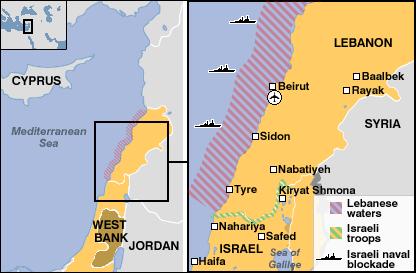
HAIFA, Israel — Shops were open, streets bustled with traffic and restaurants were packed with customers Friday in this seaside town just 25 miles south of the Lebanese border.
Still, there were signs life here had changed: Radios and televisions blared frantic newscasts, some supermarkets ran short of canned goods and residents talked openly of war.
Indeed, some people in Haifa seemed to look forward to a fight with Hezbollah guerrillas.
"Israel should act now and do whatever needs to be done," said Shmuel Rottman, 78, who has lived in Haifa all his life. "We're going to put them in their place, and we have to do it while we still have time."
The two rockets fired on Haifa on Thursday landed feebly on sidewalks near the city center, causing no casualties. But they sent a message that hundreds of thousands more Israelis were now within range of deadly attacks.
Other places were not so lucky: In the town of Meron, an Israeli family was sitting in its living room as the Jewish Sabbath began at sundown Friday when a Hezbollah rocket blew a hole in the wall of the house, killing a woman and her 5-year-old grandson. The force of the blast threw the boy into the yard below.
Brush fires erupted in open fields throughout northern Israel, as Hezbollah kept up an almost nonstop barrage of rocket fire.
Thousands of residents fled the northern towns of Nahariya and Kiryat Shemona, often targets of Hezbollah rocket attacks, leaving behind virtual ghost towns, as the only residents who opted to stay holed up in bomb shelters.
Angered by the Hezbollah attack and almost nonstop rocket barrages on their towns and villages, Israelis gave the army widespread support for its largest operation in Lebanon in two decades.
Itzik Zachari, 31, said Hezbollah had crossed a line with the attack and said he was "looking forward" to fighting Hezbollah in Lebanon.
"I was really shocked," he said. "I know they have that kind of weapon, but to use it against Haifa is a declaration of war."
Israel launched its attack on Lebanon after Hezbollah carried out a brazen cross-border raid Wednesday, capturing two soldiers.
On Friday, Israel demolished the Beirut home and office of Hezbollah's leader, Sheik Hassan Nasrallah. Nasrallah was reported safe, and said on Hezbollah television that the group was prepared for "open war" with Israel.
With Hamas militants in Gaza expanding the range of their homemade rockets along the southern border, Israel finds itself sandwiched between militant groups that are using inaccurate but sometimes deadly rocket fire to sow fear.
"When the Katyusha fell, we understood that it was war," said Judy Golan, 55, referring to the type of rockets fired by Hezbollah. "We were waiting for it."
Haifa, the third-largest city in Israel, is the deepest target inside the country ever hit by Hezbollah. It is home to Israel's largest passenger ship port, oil refineries and several key industrial installations.
It is 25 miles from the Lebanese border to the north. Hezbollah now has rockets that could go about 40 miles, Israeli army chief of staff Lt. Gen. Dan Halutz said.
In Haifa on Friday, the army allowed residents to remain outdoors for most of the day despite the threat of more rocket attacks.
And while restaurants and streets were full, beaches were less crowded, and bread shops sold out quickly. Some gas stations had stayed open well past closing time Thursday.
By evening, the army ordered Haifa residents back into bomb shelters or bombproof rooms in their homes, preparing them for a weekend to be spent mostly indoors.
"I'm a little scared," admitted Taner Elizarov, 24. "There's a feeling of war."
